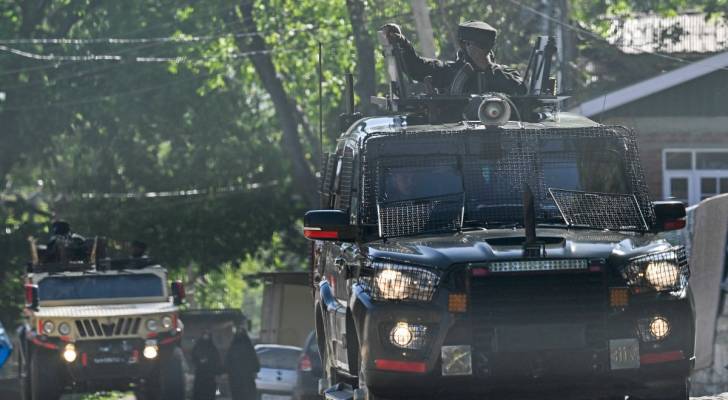Indian army patrols on way to Hapatnar in Anantnag district south of Kashmir (Credit: AFP)
Pakistan urges UN to advise India to "exercise restraint"
Pakistani Prime Minister Shehbaz Sharif has called on UN Secretary-General António Guterres to urge India to show restraint following deadly violence in Indian-administered Kashmir, which New Delhi has linked to Pakistan, Agence France-Presse (AFP) reported.
In a statement released by Sharif’s office on Tuesday, the Pakistani leader dismissed India's claims of involvement and issued a warning against any aggressive moves from its neighbor.
"While underscoring that Pakistan shall defend its sovereignty and territorial integrity with full force in case of any misadventure by India, the Prime Minister encouraged the UN Secretary-General to counsel India to act responsibly and exercise restraint," the statement said.
Read more: India-Pakistan tensions surge as Kashmir border clashes intensify
Tensions between India and Pakistan, two nuclear-armed neighbors, have flared once again as both nations continue to exchange fire across the Line of Control (LoC) in the disputed region of Kashmir.
The recent skirmishes, which began following a deadly militant attack on April 22 in Indian-administered Kashmir that killed 26 people, mostly tourists, in the resort town of Pahalgam.
This incident has reignited longstanding animosities, pushing bilateral relations to their lowest point in years. As both countries ramp up military and diplomatic measures, the international community is urging restraint to prevent further escalation in a region that has long been a flashpoint for conflict.
- Conflict background -
Kashmir, a Himalayan territory divided between India and Pakistan since their partition in 1947, remains a core point of contention between the two nations. Both countries claim the Muslim-majority region in its entirety but administer separate portions, with the LoC serving as a heavily militarized de facto border.
The region has been the site of two of the three wars fought between India and Pakistan, as well as numerous smaller skirmishes and insurgencies. Rebel groups, some allegedly supported by Pakistan, have waged a decades-long insurgency in Indian-administered Kashmir, demanding either independence or unification with Pakistan.
India accuses Pakistan of fostering cross-border terrorism, a charge Islamabad denies, asserting it only provides moral and diplomatic support for Kashmiri self-determination.
The April 22 attack in Pahalgam, claimed by a little-known militant group called the Kashmir Resistance (also known as The Resistance Front, or TRF), has been linked by Indian authorities to Pakistan-based Lashkar-e-Taiba, a terrorist organization responsible for the 2008 Mumbai attacks.
The attackers reportedly targeted Hindu tourists, asking victims their religion before opening fire, killing 25 Indian citizens and one Nepali national. The massacre shattered claims by Indian Prime Minister Narendra Modi’s government that peace had been restored in Kashmir following the 2019 revocation of the region’s semi-autonomous status.
- Recent cross-border clashes -
The exchange of fire along the LoC began on April 24, 2025, and has continued intermittently, with reports of small-arms fire and, in some instances, heavier artillery. Indian military sources claim Pakistani troops initiated “unprovoked” firing from multiple posts along the LoC, prompting a retaliatory response.
Pakistan, however, has not officially confirmed these claims, though a senior official in Pakistan-administered Kashmir reported overnight clashes in areas like the Leepa Valley, with no civilian casualties noted. Posts on X indicate that fighting spread to other areas, including Samahni and Neelum, with unconfirmed reports of Pakistani forces using heavier weaponry.
On April 26, Indian media reported that Pakistan violated the ceasefire for a second consecutive night across the entire length of the LoC, with exchanges documented in the Uri sector. No casualties were reported in these specific incidents, but the sustained nature of the clashes has raised concerns about a broader escalation.
Indian security forces have intensified operations in Kashmir, launching “search-and-destroy” missions, deploying drones, and demolishing the homes of suspected militants, including those believed to be linked to the Pahalgam attack.




